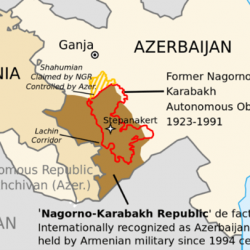The humanitarian condition is deteriorating in the Armenian-majority breakaway region of Nagorno-Karabakh. The Lachin corridor, the only road that connects the region to the outside world, has been blocked by a military campaign limiting food and other essential supplies and trapping 120,000 people.
We explore the legal, political and military implications of this campaign. How are international actors responding to this campaign? What role are Turkey, Russia, and the United States playing in the blockade of Nagorno-Karabakh? [ dur: 58mins. ]
- Richard Giragosian is the Founding Director of the Regional Studies Center (RSC), an independent “think tank” located in Yerevan, Armenia. He is Visiting Professor at the College of Europe’s Natolin Campus and Senior Expert at Yerevan State University’s Center for European Studies (CES). He is the author of the book chapter Small States and Large Costs of Regional Fracture: The Case of Armenia.
- Steve Swerdlow is Associate Professor of the Practice of Human Rights in the Department of Political and International Relations at the University of Southern California. A human rights lawyer and expert on the former Soviet region, Swerdlow was Senior Central Asia researcher at Human Rights Watch, heading the organization’s work on Uzbekistan and Tajikistan, and founding its Kyrgyzstan field office. He is the author of Uzbekistan’s Religious and Political Prisoners and Uzbekistan’s Ethnic Minorities: Out of Sight, But Not Out of Mind.
This program is produced by Ankine Aghassian, Doug Becker, Melissa Chiprin, Mihika Chechi, and Sudd Dongre.
Podcast: Play in new window | Download (Duration: 58:01 — 53.1MB) | Embed
Subscribe: Apple Podcasts | Spotify | RSS
